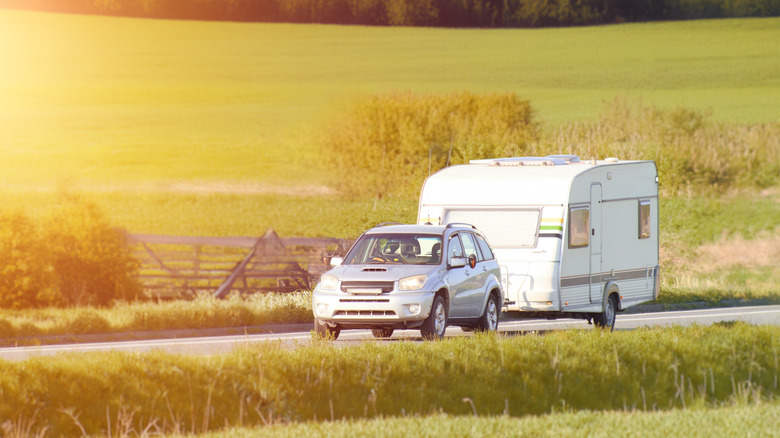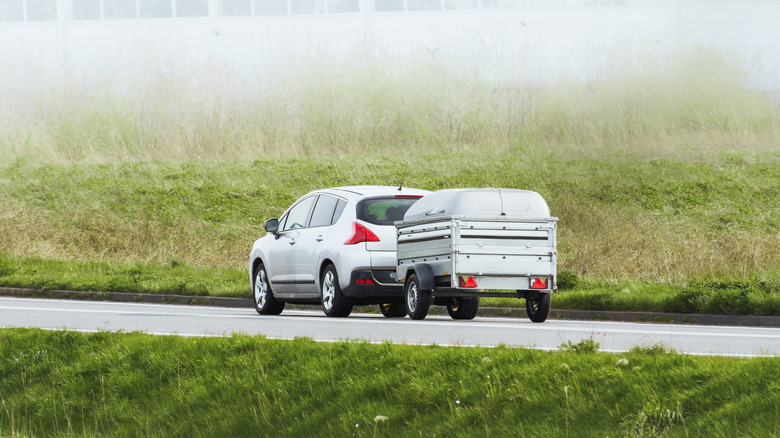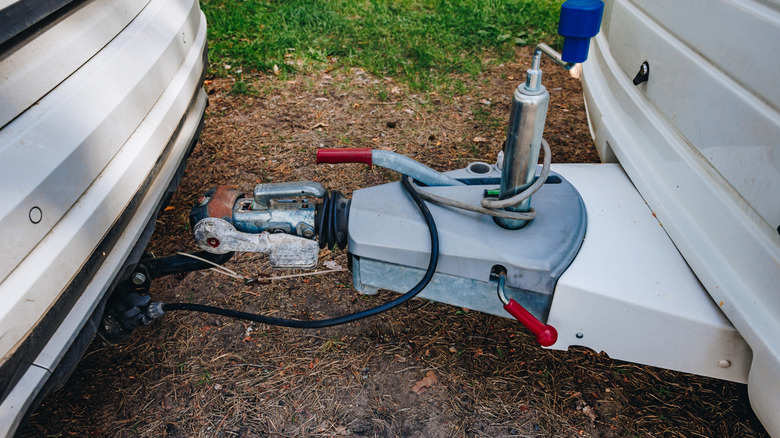Here's What You Should Do If Your Trailer Starts Swaying While Towing
We may receive a commission on purchases made from links.
A standalone trailer is a great way to haul large and unwieldy loads long-distance, especially if your vehicle either isn't big enough to accommodate the load on its own or already has a trunk or bed stuffed full with cargo. Travel trailers from the best brands in particular ensure you always have a home away from home on the road. However, as convenient as carting a trailer around can be for transport and travel, you should always remember that having a trailer hitched to your vehicle is not the same thing as putting stuff in your trunk. A trailer is almost like a vehicle in itself, and it doesn't take a lot of force for it to stop playing nice.
Whether it's from bad road and weather conditions or less-than-ideal driving practices like excessive speed or poor weight distribution, there are a variety of factors that can cause your trailer to start swaying independently of your vehicle. A swaying trailer is like a pendulum, gradually swinging back and forth, picking up momentum; if left unchecked, it could end up swinging itself and your vehicle along with it, right off the road. If you're going to hitch up a trailer, it's important to know the vital safety steps for safely stopping swaying on the road, as well as what measures you can take to ensure it doesn't start swaying again.
Let your vehicle slow to a stop while keeping the wheel straight
If you're hauling a trailer along a stretch of road and notice it begins to sway back and forth behind you, it's vital that you act swiftly, yet calmly to deal with it. Sudden moves like acceleration, slamming the brakes, or cutting the wheel could end up making the sway worse, further throwing off your vehicle's center of gravity. Do not attempt to "match" the sway by cutting the wheel in the same direction as its movements; that will only make it worse.
When sway manifests, the first and foremost thing you need to do is slow down. Take your foot off the gas pedal, keep your steering wheel straight, and let your car's speed gradually decrease as you coast along the road. You need to let this happen naturally, as attempting to slam the brake pedal will just end up worsening the sway. If your vehicle is equipped with dedicated trailer brakes, you can give them a couple of quick, gentle squeezes once the vehicle has slowed down a bit to help get the trailer back in line. As your vehicle slows, the sway should gradually settle down.
You might be tempted to immediately get back up to speed once the sway calms down, but it would be a better choice to find somewhere to pull over and stop entirely. You should stop your vehicle and give the trailer and its hitch a quick inspection, just to make sure nothing has bent or broken. Even when you do get back on the road, try to keep things at a slower pace than you were driving previously, just in case.
Take measures to prevent swaying from occuring
As important as it is to have a playbook ready to handle sway in the middle of a drive, it would be better if it never manifested in the first place. To that end, there are some preventative measures you can take beforehand to reduce the likelihood and impact of sway on the road. For example, having a braked tow versus an unbraked tow gives you extra brakes for safe stopping, though these are intended primarily for dealing with bad weather conditions like powerful winds.
More than specialized gadgets, one of the most important tips for safely towing a trailer or camper is to properly balance and hitch it to your vehicle. When loading a trailer for a trip, you want to keep its contents balanced and weight safely distributed so it's not listing in either direction. Try to keep about 60% of your load's weight focused toward the front of the trailer, with the overall load balanced between the left and right sides. You should also bind and tie your trailer's contents if you can, as this will prevent them from getting loose and bouncing all over the place.
You should be especially mindful of your vehicle and trailer setup's tongue weight, or the weight that's placed on the hitch and rear of your vehicle by an attached trailer. The tongue weight should be about 10-15% of your loaded trailer weight, heavy enough to keep the trailer grounded but light enough that it can move. Consider purchasing a tongue weight scale on Amazon if you don't have one. You also might want to consider installing a sway bar, a special hitch with built-in resistance pads that can keep a trailer from swaying.


